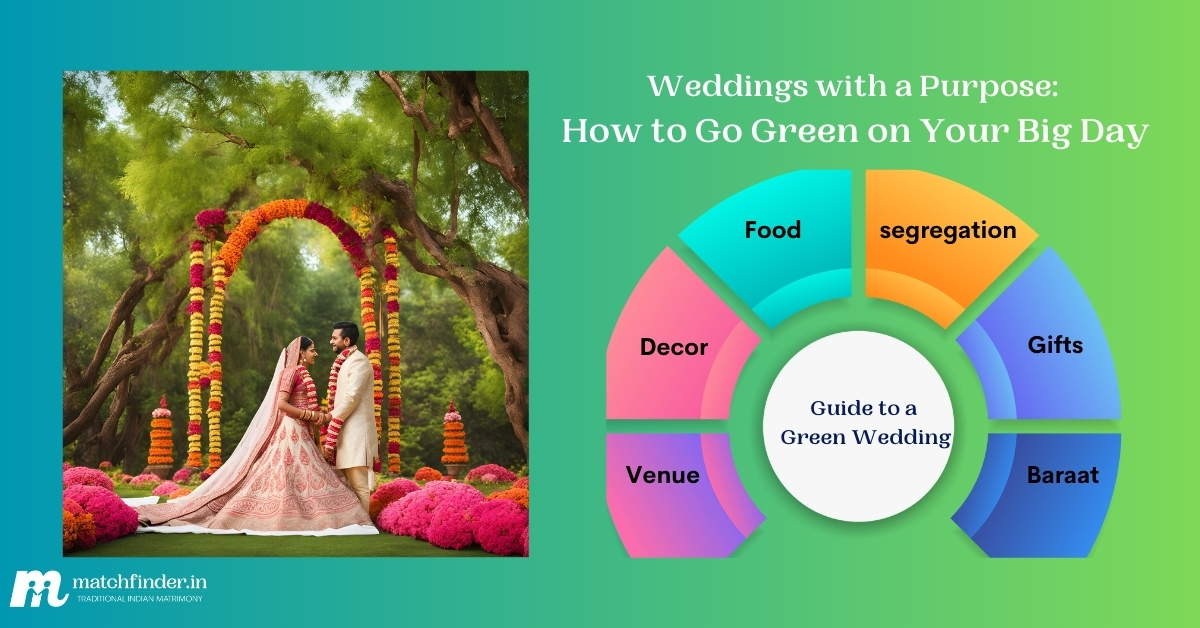In recent years, the environmental impact of weddings has become a growing concern, with the average wedding generating approximately 400 pounds of waste and 63 tons of CO2 emissions. From lavish decor to excessive food and plastic waste, traditional weddings contribute significantly to environmental pollution. With around 10 million weddings taking place annually in India alone, the environmental toll is substantial. However, for eco-conscious couples, there are several ways to reduce their wedding’s carbon footprint while still celebrating in style. By making small, thoughtful changes, such as reducing waste, choosing sustainable options, and supporting eco-friendly initiatives, you can turn your big day into a beautiful, environmentally friendly affair.
Before going for solutions, let’s first consider where the waste is generated. Among them are plastic water bottles, glasses, plates, décor waste, food waste, crackers, and cloth waste. Now that we know the problems, let’s see how we can find solutions for each of them.
Venue
Choose an outdoor venue with open space (keeping the weather in mind). This reduces the need for extra lighting and décor since nature provides a natural backdrop. If you choose an indoor venue, go for minimal or artificial décor that can be reused, reducing your carbon footprint.
Décor
If you opt for heavy or natural décor, make sure to send the flowers for composting afterward. There are many organisations that make compost from these or create other items like candles, incense sticks, and more.
Food Waste
Food waste is a big problem at weddings. In the urge to impress, people often include too many items in the menu, leading to wastage. To avoid this, you can keep the menu minimal, and if there’s still leftover food, collaborate with NGOs like the Robin Hood Army to distribute it among the needy.
Plastic Plates, Cups, Glasses
Plastic plates, bottles, and cups are major waste contributors. Replacing these with steel plates and glassware can significantly reduce waste. While concerns about sanitation and hygiene are valid, hiring help to ensure proper cleaning will go a long way in minimizing waste. If reusable plates aren’t an option, try to segregate and send them for recycling if possible.
Gifts
A lot of waste is generated through gifts. Friends and relatives often bring gifts as tokens of love, but sometimes they can become overwhelming, and you end up with things you don’t need or use. You can avoid this by asking your loved ones to gift only what you need, or by requesting no gifts at all. It might sound rude, but with a little convincing, you can avoid unnecessary items. Alternatively, you can ask them to donate to a cause instead.
Return Gifts
There’s often pressure to impress guests with return gifts, leading to the purchase of items they may not use. Instead, consider eco-friendly options like gifting a plant as a wedding memory.
Dress
Cloth waste is a major contributor to environmental degradation, as producing one piece of cloth consumes a lot of water. To minimize this, choose outfits for your wedding that you can reuse after the event, or consider wearing your mom’s wedding saree. This not only reduces waste but also allows you to cherish old memories.
Baraat and Crackers
Everyone loves a baraat and dancing to lively beats, but it can result in noise pollution, traffic congestion, and pollution from crackers. You can opt for alternatives like using e-scooters for your baraat, arriving with your friends in a fun, eco-friendly way. Or, you could take inspiration from Nupur Shikhare and jog to your wedding with your friends.
Other Ways
Going all out for your wedding is fine, but what if you donate some amount to a cause that creates a long-lasting impact? This way, your wedding can be remembered for something more than just a grand celebration.
If you’re looking for a partner who shares your eco-friendly values, Matchfinder Matrimony can help you find your nature-loving match, with over 5 lakh profiles from different religions, castes, cultural backgrounds, professions, and educational backgrounds. So, what’s stopping you from finding your eco-conscious partner? Sign up and register now!
